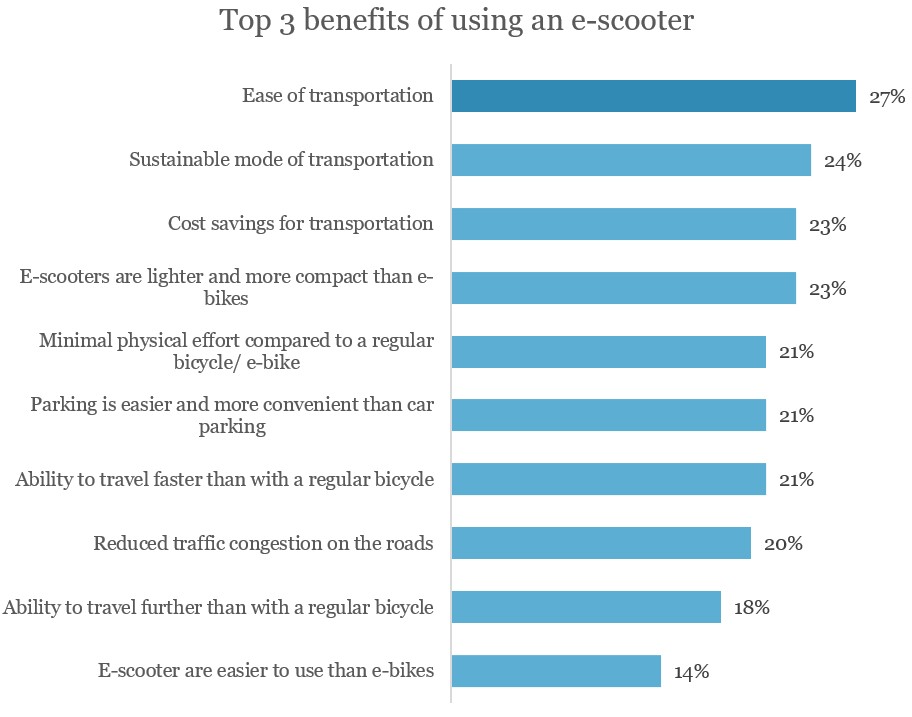
As discussed in my previous article, micromobility, including e-bikes and e-scooters, is essential for urban transportation, particularly in cities like London. However, e-scooters are facing significant challenges due to stricter regulations. Savanta’s General Public Omnibus explores consumer uptake of e-scooters and attitudes towards the e-transport movement.
The current picture of e-scooter deployment in London
Back in 2021 when rental e-scooters and e-bikes hit the streets, the number of e-scooters outweighed the e-bikes (20,000 vs 16,000)[1]. Now, there are just 4,425 e-scooters currently available for hire across 10 London boroughs[2], compared to an estimated 30,000 rental e-bikes[3] across 16 boroughs, with optional regulations around parking enforced on an individual borough level.
As a result, the CEO of Voi, Fredrik Hjelm, has commented that the e-scooter scheme in London is the ‘worst out of over 100 cities in Europe’. Voi – currently a part of London’s e-scooter trial alongside Lime –may soon choose to withdraw due to financial viability unless a significant number of e-bikes are deployed (estimated as 20,000)[4].
Consumer uptake of e-scooters
Data from Savanta’s general public omnibus reveals that three in ten (29%) respondents who are able to, have used a rental scooter. Just as with e-bikes, usage of e-scooters is closely related with age with younger consumers aged 18-24 more likely to rent an e-bike (59%) and e-scooter (56%), than those aged 25+.

Interestingly, despite the disproportionate spread of e-scooters and e-bikes in London, their usage rates are similar. This could be because about 70% of the UK population does not cycle according to the National Travel Attitudes Study, making e-scooters, which require less technical skill, easier to use[5].
Ease of transportation is a key benefit of using an e-scooter. Respondents see them as a sustainable, cost-effective travel option that is lighter, more compact, and requires less physical effort than e-bikes.
Women are more likely to highlight the ease of transportation with e-scooters (31% vs 23% of men) and find them easier to use than e-bikes (18% vs 12% of men). Men are more likely to value their sustainability (27% vs 21% of women) and light, compact design (27% vs 19% of women).

Attitudes towards e-scooters
Respondents show support for the e-scooter regulations already in place, with three quarters of respondents (75%) expressing agreement with the notion that e-scooters should be more tightly regulated than traditional bicycles, as they pose safety concerns on shared paths and pavements due to speed (75%), with riders often not complying with road rules (73%).
And when compared to e-bikes, respondents are slightly more mistrusting of e-scooters. They are more likely to agree that e-scooters are dangerous (73%), should be tightly regulated (75%), should require a driver’s licence (56%) and should not be allowed in cycle lanes (50%). E-bikes are viewed more positively, and favoured as the easier to use, more sustainable option (70%).

E-scooters are in a difficult situation in comparison to e-bikes, facing tighter regulations, and little space for said regulations to be loosened. Furthermore – the public has not expressed an appetite for restrictions to be amended. However, with increasing numbers of London boroughs imposing parking restrictions on e-bikes, there might be a chance for e-scooters to compete as the playing field becomes more level.
Savanta’s General Public Omnibus is the perfect channel to understand your consumers’ views and behavioural patterns. Contact Savanta today to learn how we can help you track consumer preferences and views in the ever-evolving transport industry.
[1] https://zagdaily.com/places/2021-by-the-numbers-shared-e-bikes-in-the-uk/#:~:text=At%20the%20end%20of%202021,of%20these%20are%20in%20London.
[2] https://londonroadsafetycouncil.org.uk/londons-rental-e-scooter-trial-extended-until-may-2024/
[3] https://www.theguardian.com/cities/2024/jan/14/lime-bikes-london-pavements-wayne-ting-ebikes-scooters#:~:text=Of%20the%2030%2C000%20or%20so,bikes)%2C%20though%20Lime%20does%20not
[4] https://uk.news.yahoo.com/e-scooter-hire-firm-voi-155550110.html?guccounter=1&guce_referrer=aHR0cHM6Ly93d3cuZ29vZ2xlLmNvbS8&guce_referrer_sig=AQAAAAULpibpZkC57oAAW8oUwCW4A7Ni9RVrJPh7OkPcF4g1Ql1eLq6oVOnaik3dHmketcPYy7-zJxiEs0o-1601mJrFYALNKCbWj87bSjAHXP6652StyGhUUI77woqo6CP4af5Sc7ws4XtVrncTB6D-K1YPd2yfqrQeYO9CMLgCC_LN
[5] https://www.gov.uk/government/statistics/national-travel-attitudes-study-wave-9/national-travel-attitudes-study-ntas-wave-9-cycling




